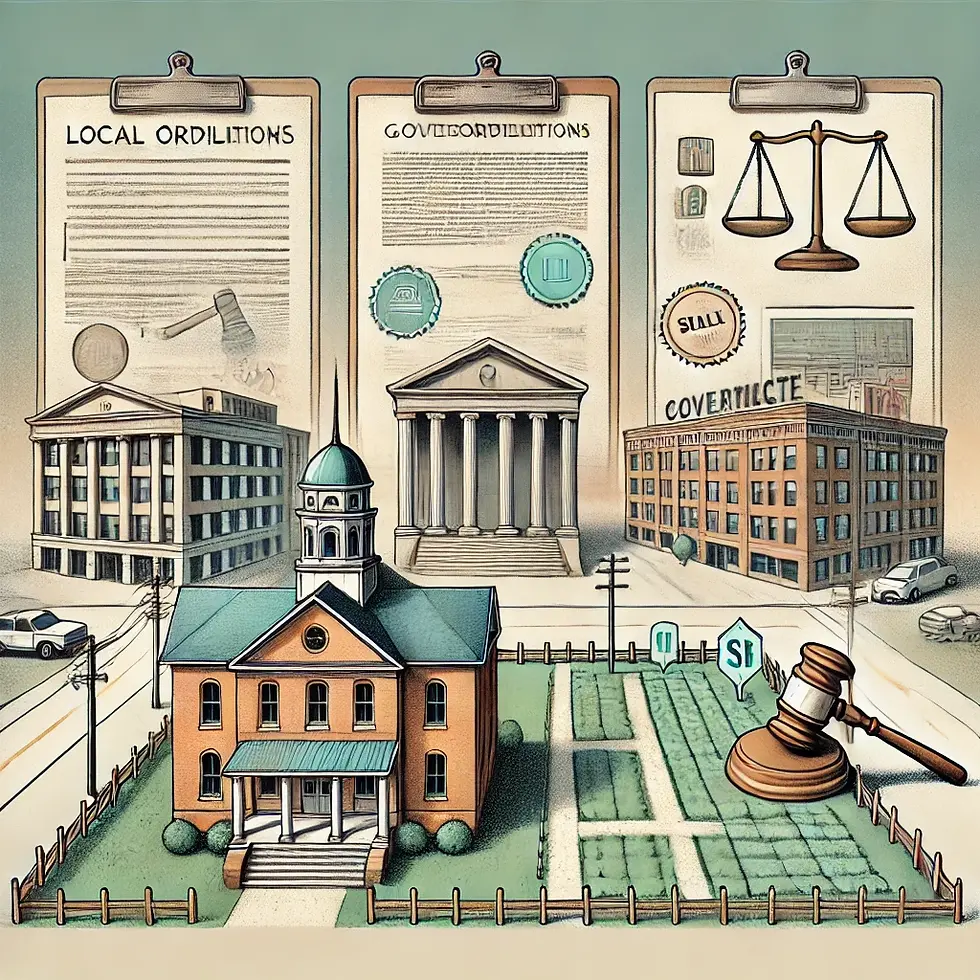Challenges in Land Development: The Implications of Local Governments Misapplying State Law
- Justin Tahilramani

- Aug 31, 2024
- 4 min read

The complexities of land development in North Carolina are underscored by the delicate balance between local ordinances and state law. Recent events involving the refusal of a North Carolina municipality to record an exempt plat raise significant concerns about the interpretation and application of N.C. Gen. Stat. § 160D‑801, which governs subdivision exemptions.
The Issue: Misinterpretation of Exempt Subdivision Status
A real estate development group recently encountered a significant hurdle when attempting to subdivide a parcel of land into three separate residential lots. The plat submitted for recording was prepared in strict compliance with N.C. Gen. Stat. § 160D‑801, a statute that allows certain subdivisions to bypass the full subdivision review process imposed by local ordinances.
The plat was reviewed and affirmed by two North Carolina Licensed Professional Surveyors, who concluded that it met all the necessary criteria for an exempt subdivision. A critical component of the plat was an access easement, intended to prevent any of the subdivided lots from being classified as "landlocked."
Despite this, the municipality’s planning department, supported by the city attorney's office, refused to record the plat. The refusal was based on the interpretation of the municipality's Unified Development Ordinance (UDO), which imposes strict requirements on subdivisions, including that all lots must abut a public or private street built to public standards. The local authorities argued that the plat did not meet these criteria and therefore could not be recorded as an exempt subdivision.
Legal Context: The Role of Access Easements and State Law
Under North Carolina law, access easements are a recognized and valid means of ensuring that lots are not landlocked. The North Carolina Court of Appeals has consistently upheld this principle in cases such as Stegall v. Housing Authority of City of Charlotte and Schwarz v. Vickery. These cases confirm that an easement providing access to a lot satisfies legal requirements, even if the lot does not abut a public street.
Furthermore, N.C. Gen. Stat. § 160D‑801 explicitly outlines the conditions under which a subdivision can be exempt from the full review process. The statute's purpose is to streamline the subdivision process for smaller or simpler land divisions, reducing the regulatory burden on property owners and developers. When a plat meets the statutory requirements, local governments are generally expected to record the plat without imposing additional requirements that exceed those outlined in state law.
The Dispute: Local Ordinance vs. State Law
The municipality’s refusal to record the plat, based on its local UDO, appears to be a misapplication of its authority. The UDO's subdivision requirements should not apply to plats that qualify as exempt under N.C. Gen. Stat. § 160D‑801. By insisting on adherence to subdivision standards that are not applicable to exempt plats, the municipality is effectively overriding state law, creating unnecessary barriers for property owners and developers.
This situation highlights a broader issue that can affect anyone involved in land development in North Carolina. When local governments misinterpret or misapply state law, it can lead to legal disputes, delays, and increased costs, undermining the intent of the state’s regulatory framework.
Overcoming These Challenges: Recommendations for State-Level Action
To address these challenges, several steps can be taken at the state level:
Clarify the Law: The North Carolina General Assembly should consider issuing additional guidance or amendments to N.C. Gen. Stat. § 160D‑801 that clearly delineate the limits of local government authority in the subdivision process. This could help prevent future misinterpretations of the law by local officials.
Training and Education: State agencies responsible for land use and development should offer regular training and resources to local government officials, ensuring they are fully informed about state statutes governing land development, including the specifics of subdivision exemptions.
Establishing a Review Mechanism: The state could create a formal review mechanism or advisory board that property owners and developers can turn to when disputes arise over the application of state law versus local ordinances. This body could provide non-binding recommendations or mediations, helping to resolve conflicts before they escalate to litigation.
Enhanced Communication: Encouraging better communication between state and local authorities could reduce instances of legal conflict. Regular updates from state agencies regarding changes in land use laws and interpretations could help ensure that local ordinances and practices align with state statutes.
Legal Recourse: Property owners and developers should be aware of their rights under state law and prepared to seek legal recourse when necessary. Filing for a declaratory judgment in Superior Court, as a last resort, can ensure that state law is upheld, and local governments are held accountable.
Conclusion: The Importance of Upholding State Law
The refusal of a North Carolina municipality to record an exempt plat, despite its compliance with state law, underscores the importance of ensuring that local governments adhere to the statutory framework established by the state. When local ordinances are misapplied, it not only affects individual property owners and developers but also undermines the broader goal of creating a fair and efficient land development process in North Carolina.
Stakeholders in the real estate and development sectors must remain vigilant and proactive in addressing these issues. By working together at the state and local levels, we can ensure that the rights of property owners are protected and that North Carolina remains a favorable environment for responsible land development.



Comments